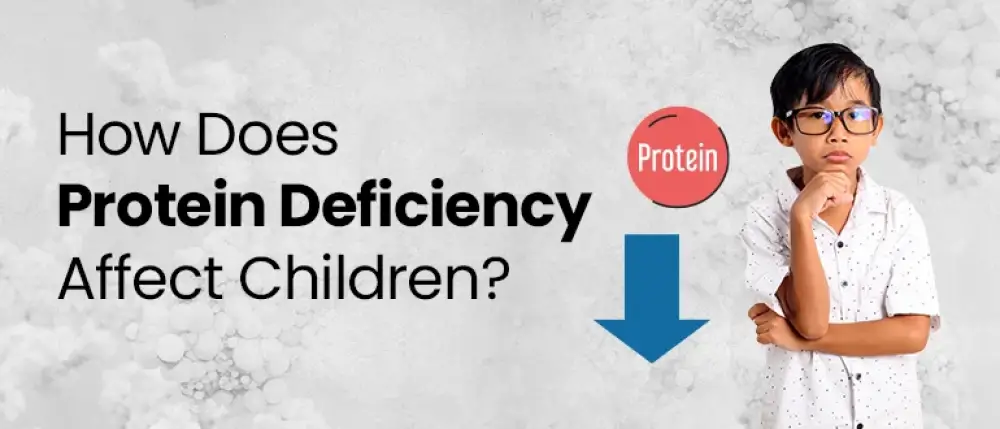Subscribe to get weekly insights
Always stay up to date with our newest articles sent direct to your inbox
Published on 12 Aug, 2024
3487 Views
5 min Read

Written by Riya Lohia
favorite0Like
favoriteBe the First to Like
29-year-old Reema often worried about her twin girls, who were shorter than most of their friends, and whether they were getting enough nutrition. Like any concerned parent, Reema did her research to find the probable causes of deficiencies in children. During her study, she discovered that 54% of Indian children are not growing properly, being either underweight, too short for their age, or overweight. A major reason for this can be a protein deficiency.
It is suggested that an Indian child should consume about 0.8-0.9 grams of protein per kilogram of body weight each day. This means, for a child weighing around 25 kilograms, this means they need approximately 22 grams of protein daily. Although this may seem small, the predominantly cereal-based Indian diet often lacks sufficient protein. As a result, it can be a leading cause of developing a protein deficiency disease.
Most Indians identify as vegetarians. Yet, data shows that 91% of vegetarians have greater levels of protein deficiency than 85% of non-vegetarians. Indians have a misconception that protein is essential for weightlifters, athletes, and other sportspeople. This is simply incorrect.
Reema’s girls weren’t athletes or involved in sports. Yet, they lacked protein. The bottom line is, that proteins are not specifically beneficial for those who wish to gain muscle mass, are undernourished, or are bodybuilders. In adequate amounts, it is equally necessary for the general population, including adults.
As for the girls, Reema discovered that consuming enough protein is essential for a healthy immune system, which will later help ward off infections and diseases. Moreover, neurotransmitter activity is necessary for concentration and cognitive growth. Here, protein supports that function and overall brain health. Not only this, but protein is also the primary source of energy for children.While carbohydrates do their job well, protein helps to sustain the energy levels in youngsters.
Immediately after, Reema looked for the protein deficiency types. Here’s what she found. Children's health can greatly suffer from a protein deficiency, especially in India, where eating habits sometimes leave room for protein consumption. Below are some common signs and symptoms of protein insufficiency.
When Reema found some of the above symptoms in her daughters, she considered turning her kitchen non-vegetarian to ensure her daughters received the necessary protein. Before that, however, she consulted her family doctor, who explained that a non-vegetarian diet is not the only way to meet their protein needs.
The debate between animal and plant protein continues. While scientists still need more data to produce some solid facts, it is commonly believed that while animal protein can be a good source of the required protein, it comes with its ill effects. Plant-based protein, on the other hand, is a more comprehensive source of nutrients including protein.
Adding a variety of protein-rich foods to children's diets is important to combat the causes of protein malnutrition and diseases in India. Here are some effective options Reema has been alternatively feeding her twins. You can pick the ones that suit your food preferences, i.e., veg/non-veg.
When it comes to averting protein deficiency disease, the secret is in the balance! It becomes crucial to keep track of the protein you give your child to avoid overindulging or overnourishment. Whether vegetarian or vegan, you must balance the plant-based protein intake with other meals that nourish your children. Additionally, non-vegetarians must avoid protein-rich foods that could harm their child’s health. Overall, moderation is key.
When addressing the health effects of protein deficiency disorder in children, it is essential to consider comprehensive health insurance coverage. Plans from Care Health Insurance can help you and your family manage the costs incurred in protein deficiency treatment. With coverage options for regular health check-ups, nutritional guidance, and access to a network of healthcare providers, Care Health Insurance offers a financial shield, ensuring children receive the medical attention required to develop and thrive.
>> Also Read: Vitamin D Deficiency Causes and How to Cure It
Disclaimers: The above information is for reference purposes only. For more details about the health insurance plans and their benefits please refer to the sales prospectus, policy terms, and conditions.
favoriteBe the First to Like
Thyroid : मामूली नहीं हैं महिलाओं में थायराइड होना, जानें इसके लक्षण और घरेलू उपचार Vipul Tiwary in Diseases
शुगर कंट्रोल कैसे करे? जानें, डायबिटीज में क्या खाना चाहिए Vipul Tiwary in Health & Wellness
हाई ब्लड प्रेशर को तुरंत कंट्रोल कैसे करें? देखें इसके उपाय Vipul Tiwary in Diseases
पैरों में दर्द किस कमी से होता है? जानें, इसके घरेलू इलाज Vipul Tiwary in Health Insurance Articles
Biotin: The Miracle Vitamin for Your Hair and Skin Riya Lohia in Diet & Nutrition
Vitamin A Deficiency: Consequences and Solutions Mudit Handa in Health Insurance Articles
9 Common Signs You’re Vitamins and Minerals Deficient Mudit Handa in Diet & Nutrition
Vitamin E Deficiency: Risk, Symptoms and Dietary Sources Riya Lohia in Diet & Nutrition
Always stay up to date with our newest articles sent direct to your inbox
Loading...